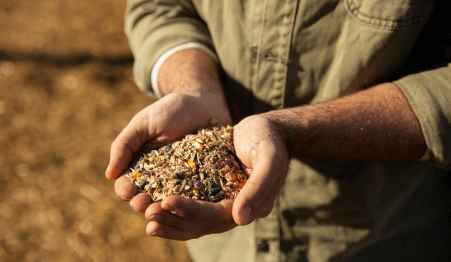The NWPGP (National Working Party on Grain Protection) Overview page highlights its role in managing post-harvest grain storage, hygiene, and chemical use in Australia. It covers the NWPGP's mission, history, strategic working groups, and annual forums.

On behalf of the Australian grain industry, the National Working Party on Grain Protection (NWPGP) is the body responsible for providing management and leadership to the industry in the areas of post-harvest grain storage and hygiene, and chemical use, outturn tolerances, international and domestic market requirements and chemical regulations. It coordinates and provides the Australian government with industry views on chemicals in use on grain and associated products, as they relate to market access domestically and for exported commodities.
The NWPGP has been in operation for 50 years. Initially, it included only State-based Bulk Handling Companies, the Australian Wheat Board and researchers. In recent years, it has evolved to include all sectors of the supply chain, recognising the role that all stakeholders have in ensuring the safe and effective use of chemicals and supply of grain that meets both market and regulatory requirements.
The NWPGP now has members across the entire grain supply chain. These include stakeholders such as:
The NWPGP hosts an annual forum providing participants with the latest research and developments, in the area of post-harvest storage and hygiene, chemical usage and outturn tolerances, international and domestic market requirements, and regulations.
For a brief overview of NWPGP please refer to below PDF Presentation or Watch Video here.

The NWPGP Strategic Working Group (SWG) is a small group within the NWPGP formed to assist NWPGP to operate successfully and achieve its desired outcomes. As a group appointed by the Chair NWPGP and the GTA Board of directors, the SWG role is to advise on issues outlined in the Terms of Reference (SWG Terms of Reference) or any other subsequent issues that may have a potential impact on GTA Members, industry in general and NWPGP functions. The SWG also assists the chair develop the agenda for the annual conference.
Current SWG members:










Working Groups are formed as required, either following discussion at the annual conference or at any time during the year when an across-industry approach to issues is required. The Chair will either invite specific participants to be members or call for nominations from industry. All Working Groups are open to all stakeholders, provided participants attend and participate on behalf of the industry rather than their own personal/company interests.
Meetings generally occur via teleconference and the frequency varies based on the specific needs at the time. Members pay their own costs, although GTA administer teleconferences, take minutes etc. on behalf of industry.
Working Group deliberations are generally made public, although some activities remain confidential. Where required, updates on activities are provided at the annual conference.
The following Working Groups have been formed in recent years:
Investigate possible causes of residues arising in specific crops.
Consider and develop research to address those issues.
Development and distribution to industry of Fact Sheets on current status of work and suggested industry management practices to address concerns.
Investigate cause of residues arising on specific commodities.
Research methods for cleaning of infrastructure.
Use findings from research to provide suitable management practices to industry when carrying grain following transport of chemically treated fertiliser
Working with affected industries, advocacy to industry on cleaning practices.
Review of current industry tools to meet market and regulatory MRL requirements.
Thinking outside the box to develop additional solutions / consider what is missing to improve industry performance.
Co-ordination of industry actions to support ongoing use of glyphosate on barley.
Feedback to stakeholders on any available research and management practices for use of glyphosate on barley to support regulations.
Review of data available to industry to recommend changes in data provision, in order to provide greater value to industry of that data.
Given a significant volume of research has been done in Australia on stored grain protection, how to better utilise that research to manage stored grain insects and grain quality in the future.
Given the increase in storages along the supply chain, how to ensure appropriate regulations are both in place and being complied with.
Developing research to provide guidance to alter label directions that better reflect industry needs.
Review of label directions to ensure best management practice and directions are appropriate for all storage types.
Grain Trade Australia
Chair NWPGP
Stay updated on industry news and events. Subscribe now for exclusive updates and insights!
DON’T MISS OUT
Self Regulatory Framework
NEWS
About GTA
Self Regulatory Framework
NWPGP
NEWS
Events
Membership
Training & Development
Street Address
Level 7
12 O'Connell Street
Sydney NSW 2000
Postal Address
PO Box R1829
Royal Exchange
Sydney NSW 1225
Contact Us
02 9235 2155
admin@graintrade.org.au
Street Address
Level 7
12 O'Connell Street
Sydney NSW 2000
Postal Address
PO Box R1829
Royal Exchange
Sydney NSW 1225
Contact Us
02 9235 2155
admin@graintrade.org.au